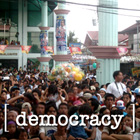
|
MUSHARRAF REGIME HAS ARRESTED OVER 7,000 ACTIVISTS, BARRICADED OPPOSITION LEADER IN LAHORE HOME 13 November 2007 Former prime minister and current opposition leader Benazir Bhutto has been placed under house arrest for the second time in one week, this time to prevent her from leading a protest march from Lahore to Islamabad. Musharraf claims new crackdown is aimed at protecting Ms. Bhutto's life, as evidence exists of a suicide campaign. Over 4,000 police are reported to be surrounding Bhutto home. Ms. Bhutto has told said she believes Gen. Musharraf is "totally out of his depth", has "failed to build a democratic base", and that he should be immediately replaced by a coalition of political interests in interim before upcoming elections. The statements mark the first time she has openly called for him to step down as president, possibly a permanent break between the two leaders, who had been negotiating a potential governing coalition. Bhutto said that Musharraf's actions were not only a threat to Pakistan's democratic future, but were dangerous because security forces should be hunting Osama Bin Laden, not arresting opposition leaders. She has suggested that Gen. Musharraf has become the single most severe threat to democracy in the densely populated, nuclear-armed nation, that his concentrating security forces "on democrats, not extremists" is preventing the moderate majority from building a stable democracy. There are reports that Musharraf's regime has proposed airlifting Ms. Bhutto from her Lahore home to an undisclosed location. For her part, Benazir Bhutto has said she will attempt to remain with her supporters, to mount protest, that she will not be moved voluntarily by government forces. Strictly ordered not to march or hold a rally in Lahore or Islamabad, Bhutto's supporters will not be spared a violent crackdown, according to the Lahore police chief, who said his agents "will resort to all means necessary, including charging with batons and tear gas" to prevent a demonstration. A Commonwealth vote on Monday urged Pakistan to lift martial law within 10 days. Observers are keenly watching to see if the US backs the Commonwealth and UK positions, which could put Gen. Musharraf's rule in question. [s]
BACKGROUND: In many parts of the world, people are presently facing the question, on a societal scale, of whether or not free and open democracy can coexist with measures taken to protect against extremism. The question is an old one and goes to the root of whether it is possible, as a matter of natural law, to vote away one's rights or to vote against democracy. To take a serious look at this question, we must first consider that: democracy is not an ideology and it is not a system; it is quite simply the idea that no form of government can be legitimate unless it is (regularly) chosen by a free and sovereign people. That can be implemented in a number of ways and need not be contrary to anyone's culture or faith. [Full Story] MUSHARRAF ARRESTS OVER 3,500 LAWYERS, DISSIDENTS, ACTIVISTS IN NATIONWIDE MIILITARY ACTION Pakistan's president, Gen. Pervez Musharraf, has signaled his willingness to resort to force to put a stop to protests against his exercise of power, suspending the constitution, rounding up opposition leaders, judiciary officials, human rights activists, and saying democracy will be restored upon his decree. Several days into a martial law decree, protests are mounting and police violence against demonstrators shows no signs of abating. Opposition leader Benazir Bhutto has called on Musharraf to hold elections as scheduled in January, to step down as military chief and to restore the constitution and the judiciary. She has said she will stage mass demonstrations in Lahore, then march with thousands of supporters across the country to Islamabad to demand his resignation if the rule of law is not promptly restored. [Full Story] WHY MUSHARRAF'S USE OF FORCE AGAINST CIVIL REFORMERS IS DANGEROUS FOR PAKISTAN, THE REGION When Pervez Musharraf came to power in a military coup d'état in 1999, he promised to restore democracy fully within 3 years' time. Symbolic elections were held under a temporary constitution, beginning his first 5-year reign. Now, under a civilian constitution, Musharraf has been re-elected to a 2nd 5-year term, though the Supreme Court was about to issue a ruling on the legitimacy of his re-election, as he had not relinquished control of the military. [Full Story] MUSHARRAF DECLARES MARTIAL LAW, SUSPENDS CONSTITUTION Pakistan pres. Pervez Musharraf, a general who came to power by 'bloodless' military coup in 1999, has been facing opposition from a national lawyers organization that says he has delayed too long in restoring the democratic process, and was facing a Supreme Court ruling that might invalidate his recent re-election. Musharraf claims he had no choice but to suspend the constitution, because Pakistan's "sovereignty" was under threat from "paralysis of government by judicial interference". The imposition of martial law, 8 years after taking power with the promise to restore democracy, is a shocking move for the general, who has been under pressure from all quarters to relinquish his role as head of the military and rule as a civilian president, elected by the people in free elections. The Supreme Court was to vote on the validity of his recent re-election to the presidency, given his refusal to relinquish control of the military. Early statements suggested Musharraf intends to rule by military decree until the elections are over: observers warn the election could not be considered legitimate if the constitution that governs it and which those elected must serve, is not in effect at the time of the vote. [Full Story] |
||||||
|
|||||||
